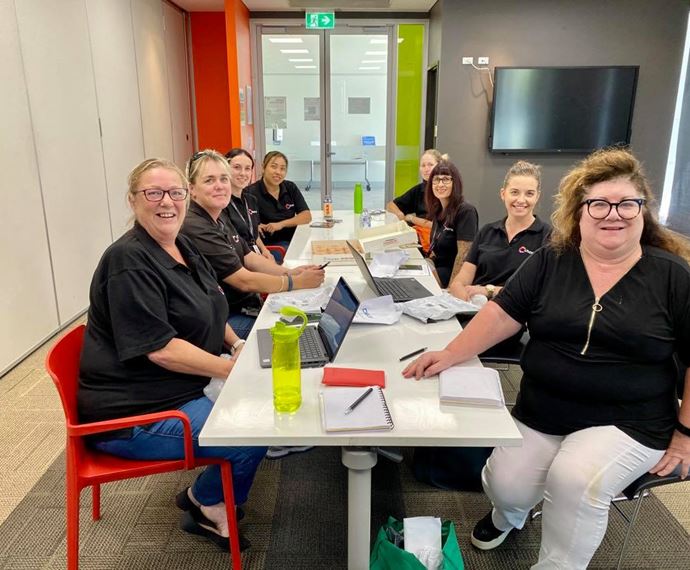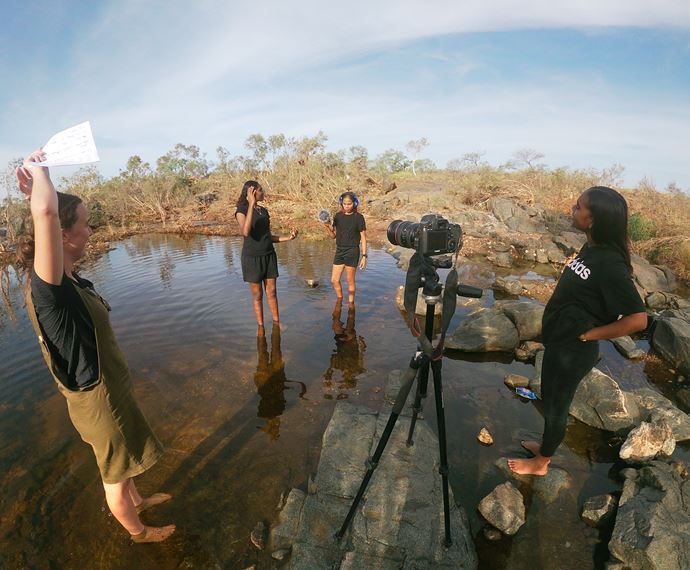Facilitating social innovation with fit-for-purpose spaces
Spacecubed Foundation Ltd is a not-for-profit organisation that supports entrepreneurs, communities and businesses to deliver social good through innovation. The organisation activated Perth’s first collaborative working space and offers co-working spaces, growth programs, and managed services to facilitate the co-creation of resilient Western Australian communities through partnerships.
Lotterywest has provided a total of $6M in grants to Spacecubed to help activate and support innovation practice in WA. Through Lotterywest support, Spacecubed was able to fit out its first co-working space offered to not-for-profit social enterprises and charitable organisations to meet, share ideas, and develop creative solutions to social problems.
To enable Spacecubed to fit out its first co-working space offered to not-for-profit social enterprises and charitable organisations to meet, share ideas, and develop creative solutions to social problems.
Social Innovation in Western Australia Ltd
1/1/2012
$600,000
Lotterywest
$200,000
Perth and Metro Area
General Community
- The refurbished space facilitated human connections and a learning ecosystem for entrepreneurial ideas to come to life.
- Over the first 10 years of operation, Spacecubed has grown through coporate partnerships, magnifying the impact of the initial investment.
- The project addressed the lack of opportunity for the social enterprise and start-up community to come together in a suitable space, discuss ideas, and collaborate to solve social issues.
- Programming, workshops, and networking opportunities created a connected ecosystem in which entrepreneurial ideas come to life.
- Over the last 10 years it has grown through corporate partnerships, magnifying the impact of the initial investment.
- Finding support for innovative solutions can be challenging; compelling communication is key.
- For Spacecubed to be successful, the importance of generating a sustainable revenue base was clear. To achieve this, a membership program was developed allowing Spacecubed members to access facilities and programs in exchange for a monthly fee.
- At the time of delivery, co-working spaces were not yet a familiar concept in Western Australia.
- The organisation had to develop strong communication tactics to sell potential customers on a vision for what Spacecubed could be.
Opportunity
Social enterprises are well positioned to explore solutions to complex challenges by providing innovative solutions. Examples include business or financial outcomes such as job creation and economic development. These unique business models focus on multiple outcomes such as sustainable profitability, environmental responsibility, and social impact. Social entrepreneurialism has been recognised as contributing to the resilience, and overall wellbeing of communities and countries.
Prior to 2012, there was limited support for the social entrepreneur community in WA. This made it difficult for social enterprises to overcome the initial market barriers to set up start-up businesses across WA. However, social enterprises are about more than money. They are collaborative and creative endeavours which are fuelled by people within the community, to benefit the community.
A critical barrier to start ups flourishing was a lack of opportunity for the community to come together in a suitable space, discuss ideas, and collaborate to solve the issues.
At the time of making this grant, Lotterywest was required to ensure its grant support was targeted and broadened its approach to grant making to focus on outcomes rather than outputs.
Approach
Spacecubed used the grant to refurbish the space which would be used by not-for-profit social enterprises and charitable organisations. Additional funding was also provided by the City of Perth, in-kind support from Stockland and personal contributions from founder Brodie McCulloch.
This included furniture, storage, paintings, lighting and technology equipment and cabling. The space allowed for a range of talks, events, and workshops to be run, creating a platform for people to drive community change and connect to explore opportunities.
Impact and outcomes
Whilst the grant went towards the physical space; the true impact of the funding was in the human connections the space facilitated. Programming, workshops, and networking opportunities created a connected ecosystem in which entrepreneurial ideas come to life. Over the last 10 years it has grown through corporate partnerships, magnifying the impact of the initial investment.
One example is She Codes (formerly Perth {Web} Girls), an organisation committed to increasing diversity in the technology workforce by inspiring 100,000 women across Australia by 2025. The future of work is increasingly digital and there’s a risk of women being locked out of these opportunities due to systemic barriers entrenched in STEM (science, technology, engineering, and maths) careers. There is evidence of inequality in the technologically enabled workforce, with women comprising 48% of Australia’s workforce but only 16% of the STEM-skilled workforce.[i]
She Codes focuses on bridging this gap, empowering women to code by offering alternate pathways into tech careers by organising free programming workshops and local events. She Codes has taught more than 4,500 women over six years, with 60% of participants getting jobs within three months of completing the program. This learning ecosystem would not have been possible without the support, facilities and connections created by Spacecubed.
![Spacecubed Photo 1[1]](/media/neqdn0qi/spacecubed_photo_1-1.jpg?anchor=center&mode=crop&width=1468&height=577&rnd=133045282688970000&quality=80)
![Spacecubed Photo 2[1]](/media/hz0pj3ob/spacecubed_photo_2-1-resized.jpg?anchor=center&mode=crop&width=705&height=705&rnd=133045282843500000&quality=80)
![Spacecubedphoto2012[1]](/media/kailed5k/spacecubedphoto2012-1.jpg?anchor=center&mode=crop&width=705&height=705&rnd=133045283178200000&quality=80)
What worked
Investing time in getting the right team
To be successful in creating change, it’s crucial to build a team of people who are passionate about what it is you’re trying to change.
Make sure you’re meeting needs
There are many ways to do this, but an easy way to start is to talk with potential customers or users of your product or service and to test it fits their need.
Key challenges
Finding support for innovative solutions can be challenging; compelling communication is key
For Spacecubed to be successful, the importance of generating a sustainable revenue base was clear. To achieve this, a membership program was developed allowing Spacecubed members to access facilities and programs in exchange for a monthly fee.
This was a challenge given that co-working spaces were not yet a familiar concept in Western Australia. The organisation had to rely on strong communication tactics to sell potential customers on a vision for what Spacecubed could be.
Similarly, timely and clear communication was also required in the grant development process. By engaging early with Lotterywest, Spacecubed could communicate the intention and expected impact of the project, which allowed Lotterywest to craft a grant to support the innovative initiative.
REFERENCES
- Korber, S., & McNaughton, R. (2017). Resilience and entrepreneurship: A systematic literature review. International Journal of Entrepreneurial Behavior & Research, 24. https://doi.org/10.1108/IJEBR-10-2016-0356
- Lumpkin, G. T., Bacq, S., & Pidduck, R. J. (2018). Where Change Happens: Community‐Level Phenomena in Social Entrepreneurship Research. Journal of Small Business Management, 56(1), 24-50. https://doi.org/10.1111/jsbm.12379
- Torres, P., & Augusto, M. (2020). Digitalisation, social entrepreneurship and national well-being. Technological Forecasting and Social Change, 161, 120279. https://doi.org/https://doi.org/10.1016/j.techfore.2020.120279
- Australian Academy of Science. (2019). Women in STEM Decadal Plan. Australian Academy of Science. https://www.science.org.au/files/userfiles/support/reports-and-plans/2019/gender-diversity-stem/women-in-STEM-decadal-plan-final.pdf
Learn about wellbeing
Understand how your community is going to help you to better target and plan your project.
Ready to plan your project?
Understand your vision, plan your impact and report on the outcomes of your project with three easy interactive tools in the Community Impact Planner.
Acknowledgement of Country
The Western Australian Community Impact Hub acknowledges and pays respect to the Traditional Owners of the land on which we are based, the Whadjuk people of the Noongar Nation and extends that respect to all the Traditional Owners and Elders of this country. We recognise the significant importance of their cultural heritage, values and beliefs and how these contribute to the positive health and wellbeing of the whole community.

